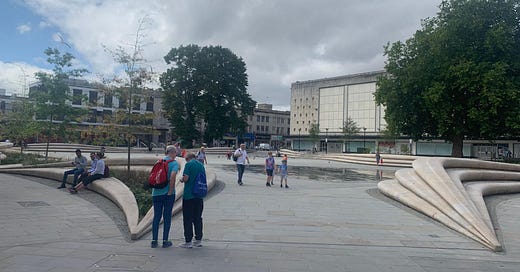It’s been quiet over here because I’ve been trying to tempt book two into being.
I even went to Gloucester to see a mirror. The reason for this will be become clear if I ever publish book two.
Gloucester itself was a strange experience. I was born there in 1975 in (at a guess) the Gloucester Royal Infirmary although I’m not 100% on that because I was an RAF baby and we were only stationed nearby. It wasn’t home.
I go to look up RAF stations near Gloucester now and there aren’t any, but the name Little Rissington is ringing bells and that was near-ish by back in the seventies.
I was talking to a writer friend on Instagram and it turns out she’s from there too, but she actually grew up in the city. “It’s such a depressing place. I think it’s the ley lines…” she said.
I did find the city depressing. So much abandoned, so few people, so little hope. The usual little bursts of history, a cathedral, the docks, but mostly a feeling of being lost.
And there is a lot of woo and spookery associated with the towns and villages around Gloucester. Several friends live in Stroud which is woo central and the landscape is dotted with stone circles and white horses like a Ravillious painting come to life.
Book two is pulling me quite forcefully in that direction and I’m happy to follow. Like she said, must be the ley lines.
So, out I came on a July afternoon in 1975 and I don’t know how long we were in the area after that, but by the time I was toddling we were in Northern Ireland at RAF Aldergrove. It was, I’m told, not a fun time to be British military in that region.
Mum remembers (she doesn’t remember much now which is a shame because she’s the only one left) pushing my buggy down the Falls Road and speeding up at every checkpoint because the armed personnel at each one was considered a target.
Apparently, we arrived on the ferry and dad got us a bit lost on the way to the base, driving our old Renault with British number plates through some of the most dangerous areas of Belfast. He was told he was lucky we weren’t shot at.
This is all through the filter of one old woman’s memory now and a lot of time, so I don’t know if it’s really true. Probably a version of it.
I only found out recently that the whole time we lived on Aldergrove airbase, my dad carried a gun.
He told me he found a novel way to keep tabs on me and my brother when they went to another couple’s married quarters for dinner. He took some cable from an old fighter plane wiring loom and hooked up the baby monitor to it, trailing the yards and yards of wire between the two houses so he could keep an ear out for us.
Seventies parenting. (If your dad was MacGyver.)
It was the seventh anniversary of dad dying at the weekend. I keep remembering that he doesn’t know I’ve written a book. I should tell him. We’ll trail a wire between this life and the next and I’ll communicate it through the crackle.
Except I don’t believe there’s anything after this. I never found it comforting to imagine him and my brother and the baby daughter Col lost a few days after she was born and their chocolate Labrador all smiling in a garden somewhere.
Every living thing riding up a Powell and Pressberger escalator to the clouds, infinity filling up with dandilions and cab drivers and frogs and civil servants. I don’t believe it.
I think any form of religion and its accompanying afterlife serves as a comfort only. “This can’t be it.” It can. And that’s OK.
I wrote a piece about the BBC sitcom Ghosts coming to an end and I went on at length about how beautifully, perhaps more than any drama that’s tried, Ghosts underlines the fact that life is important because it ends.
It is finite, so we should try to find warmth and connection. What else is there?
Build a statue to every person who realised this before it was too late. Except they probably wouldn’t want you to go to the bother.
I would build a statue to my dad because I think he understood this. Despite the uniform, he loved folk music and a good drink and warm people and bouncing a grandchild on his knee with tears in his eyes.
He felt everything, even when his upbringing told him that was weak. He couldn’t help it.
I loved that about him most of all.




